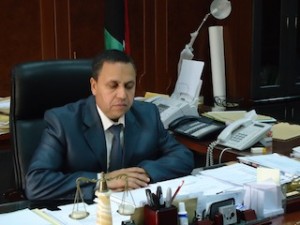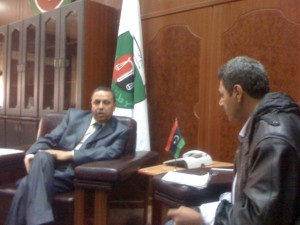The new Ministry of Justice operates of out of a distinctly shabby set of buildings not far from Qaddafi’s now thoroughly . . .[restrict]destroyed Bab Al-Aziziya headquarters. It looks more like a factory complex than a prestigious government ministry. Inside is just as grim. Down a dingy corridor on the first floor, Justice Minister Ali Humaida Ashour has his office. Libya Herald’s Ashraf Abdul Wahab visited him there and asked him about the state of justice in the new Libya.
Q. Are Libyan courtrooms currently ready to handle cases and conduct fair trials for Qaddafi’s sons and former officials?
A. There’s currently a committee charged by the Attorney General and the general prosecution to investigate Saif Al-Islam Qaddafi and those who supported him in Tripoli, Misrata and Zawia. Evidence is now being collected for the trial which will take place within a few weeks.
The ministry is now preparing the courtrooms, protection and guards needed for those accused in case they attempt to escape or are attacked by others. Special prisons have been prepared for Qaddafi supporters in Tripoli and Benghazi and others are also being set up in Misrata. They are all designed to be near the courtrooms.
Q. We have heard that some crimes, such as the murder of Omar Berbish [the former Libyan ambassador in Paris], have been committed by the revolutionary brigades in Tripoli and other cities. Have you taken any action against those criminals in terms of investigations or trials? Also, will they be tried in public in Tripoli since the murder was committed there though the accused are from Zintan and they surrendered themselves in Zintan?
A. I would like to remind you that the country is mainly reliant on three authorities – judicial, executive and legislative. In the former regime, the judicial and executive authorities overlapped – that is, the minister of justice was the chief of the judiciary.
Now after the liberation and success of the February 17th revolution, both the judicial and executive authorities have been separated in accordance with Act No. 3 issued by the NTC. Now the ministry of justice has no control over the judicial authority.
The current role of the ministry of justice is technically to prepare trials in terms of maintenance, mobilization and protection. However, if we receive any complaints from a person or an organisation about any type of penetration or attack, then these complaints will be forwarded to the office of the attorney general for action.
We received many complaints reporting torture and murder and they were all forwarded to the Attorney General’s office and today we have contacted his office to check if any action has been taken pertaining to these acts allegedly committed by revolutionaries or others.
As for the case that you referred to earlier, I have not received any information regarding it since the Attorney General’s office is taking care of that and once investigations have been completed, it will be presented for trial and I think that the trial will be held in Tripoli since the murder was committed there.
Regarding the publicity surrounding the trial, the Crimes Procedures Act and the Defense Act of the Libyan judiciary state that trials should be public except for those pertaining to morals cases; hence, everyone is allowed to attend the trial provided that he or she is not guilty of any sort of misbehavior.
Q. Some media reported that some of the former cases such as Lockerbie and the British policewoman Yvonne Fletcher have been reopened for investigation. Is there any cooperation between you and the British authorities in this regard, and will these cases be reopened?
A. As for Lockerbie, there was an American-Libyan agreement and the case has been closed after compensation was paid to victims’ families, so it would not be possible to reopen the case. However, if new evidence came to light, then Libya would not hesitate to reopen the case.
Regarding Yvonne Fletcher, I believe that this case has been closed and it is not fair to pursue the offender twice but if new evidence came to light, then Libya would not hesitate to reopen this case either.
Q. Some of the revolutionary brigades arrested a number of people who were said to be Qaddafi’s supporters such as Abdullah Senussi. He is claimed to have been caught and is now being questioned according to Abdullah Naker, the chief of Tripoli Council of Revolutionaries. Is this legal? And will courts accept these investigations into Abdullah Senussi?
A. Revolutionaries cannot act as judicial officers; therefore, whoever handles the investigations must be a judicial officer recognized by Libyan law. However, these investigations would be helpful to refer to in future official investigations but from a legal point of view, revolutionaries are not authorized to conduct investigations that should only be carried out through judicial authorities such as the attorney general or the military prosecution.
Q. If the suspects are proven to be innocent after being arrested and tortured by revolutionary brigades, would those who were involved in arresting and torturing be tried?
A. Currently there are some complaints which have been submitted by some human rights organisations concerning those who have been arrested or tortured. These complaints have been forwarded to the Attorney General for action. It is not allowed, according to law, to torture any suspects in prisons or during investigations. No one is above the law and whoever disobeys the law will be tried and punished.
Q. Human Rights Watch (HRW) has stated that they have contacted the Ministry of Justice and the Interior Ministry regarding the two British journalists arrested by Misrata revolutionaries. Have you contacted the brigade that arrested them? And will be there any accusations against the journalists or the brigade itself?
A. The ministry did not receive any information regarding this incident and the available information I have from the media is that the journalists entered the country without legal permission and took photos in military areas that they were not authorized to enter.
Q. Have you received a letter from HRW?
A. We have not received anything regarding the journalists.
Q. Sheikh Sadeq Ghariani has stated on TV that destroying graves is against Islam and Libyan law. He added that Libya must take legal actions against those involved in such acts and try the offenders. Has the ministry of justice taken any action in this regard?
A. Destroying graves is a crime according to Act Item No. 290, and arresting the ones involved in such destruction is the responsibility of the interior ministry. We have received many complaints in this regard and they have all been forwarded to the Attorney General for action.
[/restrict]









